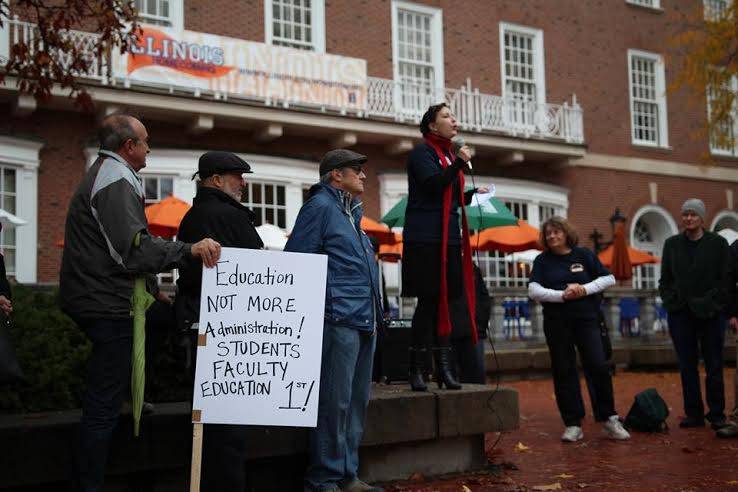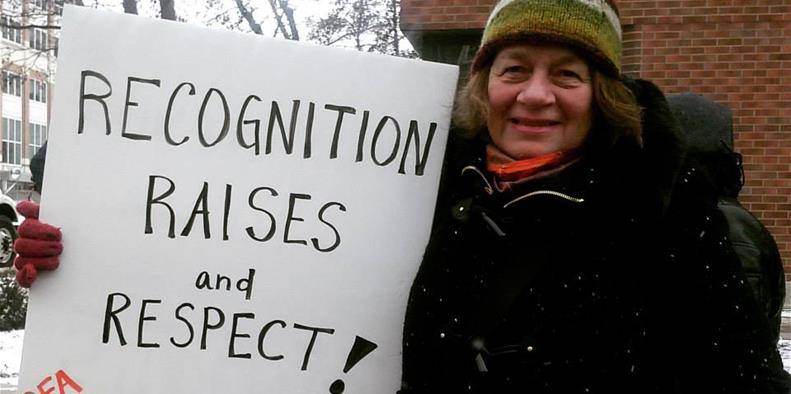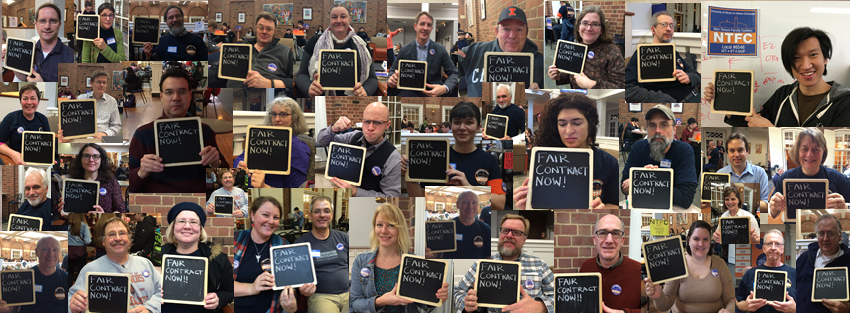Employment and job security are hot topics in the current economic climate of the United States as it appears that economic conditions in the country are improving. Job security is especially important to a specific group of people right here in Champaign-Urbana, the non-tenure track (NTT) faculty at the University of Illinois at Urbana-Champaign.
The Non-Tenure Faculty Coalition (NTFC), a certified union, was founded in 2014 in order to ensure that a “basic structure for expectations and rights,” of non-tenure faculty at UIUC be established Kay Emmert says. Emmert serves as NTFC’s Bargaining Research Chair and is the Lead Negotiator for the ongoing contract negotiation between NTFC and UIUC administrators. Though she was never part of a union prior to her role within NTFC, Emmert, a lecture within the English department at UIUC, says she has always sought ways to “shape the landscape of education.”
NTFC has been bargaining with UIUC admin since October 2014, during which time, NTFC members have had their pay frozen. Last week, NTFC and the admin met to negotiate, leaving the table with five tentative agreements, or TAs, none of which touched on economic issues. Emmert described the TAs as “boiler plate” issues, or topics that every contract addresses. Some of the biggest issues that Emmert hopes are discussed and resolved in NTFC’s upcoming bargaining meetings with the admin are reappointment rights of NTT faculty and notice of employment. In general though, the real problem that Emmert and her fellow NTFC members see, lies within the ambiguity surround NTT positions.

For example, NTT positions typically have one-year contracts. Knowing you are only guaranteed employment for a year does not mean much job security. Sometimes those contracts are renewed, which would not necessarily be a problem if all NTT faculty were evaluated the same way, at the same time. According to Emmert, some NTT faculty can work at the university for ten years and only be evaluated once, or never be evaluated at all. In addition, many NTT faculty do extra work that is unrecognized and unpaid. Also of concern is the fact that some NTT faculty have been at the university for years without seeing a pay increase that reflects the increase in the cost of living. This lack of consistency and ambiguity, Emmert says, “leads to unintentional abuse.”
One of the reasons a resolution to the contract negotiations is so important to NTFC members is so that it will allow them to plan for their futures. When individuals only have a contract for one year, with no idea if they are going to be rehired in the next, it puts a strain on individuals and their families. When those same people cannot compete for funds to conduct their research, it makes it even harder for the university to retain those individuals should they be offered additional contracts. Further, increasing the structure and security of the relationship that NTT faculty have with the university would not just help those individuals plan for their futures, it would help departments within UIUC better plan for the future as well.

Departments would no longer have to spend as much time planning for and hiring new faculty. “Our working conditions are our students’ learning conditions,” Emmert told me. Emmert and her colleagues within NTFC believe that if U of I invested more in their teachers and faculty, it would be a direct, and very positive investment in the education the university provides and the students that depend on it. And even better, U of I would be able to keep talented and incredible faculty at the university longer.
So far though, NTFC has made little headway into achieving their goals since negotiations began in the fall of 2014. Emmert hopes negotiations are completed by May this year. However, with 16 subjects left to be covered and the admin refusing to meet more than twice a month, it is unclear if this is an achievable goal. Even more discouraging is the “we agree in principle, but no,” mentality the admin seems to have towards the desires of NTFC. The admin do not know why the current system is the way it is, but it works, so they do not want to change it, says Emmert.
NTFC will not give up though. A successful negotiation, to Emmert, would be a win-win style, in which both parties come to a table with problems and solutions to discuss what is and is not possible. Rather than this process become adversarial, about who gives up power, Emmert would prefer that a structure and partnership between NTFC and the administration be developed. In the end, the hope is that UIUC admin will recognize that the increase in NTT faculty warrants a better system, and will respond to this trend by creating a better and more stable future for NTT faculty at UIUC.
If you would like to keep up with NTFC and the ongoing contract negotiation you can visit their website. The March negotiations will take place on the 9th and 30th.
Photos courtesy of NTFC Local #6546.








